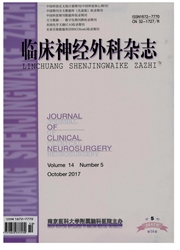

 中文摘要:
中文摘要:
目的:探讨聚己内脂-聚乙二醇二嵌段共聚物( mPEG-PCL)制备的辣椒碱纳米微球的理化性质,通过实验评价其抗胶质瘤效果。方法通过开环聚合法和溶剂分散法制备负载辣椒碱的纳米微球,应用负载荧光素纳米粒子的肿瘤细胞摄取实验以及辣椒碱纳米微球的细胞毒性实验。结果实验显示载药微球具有缓释特性,细胞可通过胞吞作用将纳米微球摄入,负载NIR-797纳米微球可以很好地透过血-脑屏障,辣椒碱纳米微球对U251细胞的生长有明显的抑制作用。结论 mPEG-PCL为载体的辣椒碱纳米微球能够有效抑制胶质瘤细胞增殖,为脑胶质瘤药物治疗提供了一条极有前途的治疗途径。
 英文摘要:
英文摘要:
Objective To explore the physiochemical characteristics of the capsaicin-loaded nanoparticles prepared by methoxy polyethylene glycol-poly ( caprolactone ) ( mPEG-PCL ) amphilic block copolymer, and to evaluate the ability of the capsaicin-loaded nanoparticles to inhibits the human glioblastoma U251 cells growth.Methods mPEG-PCL amphilic block copolymer was synthesized using the ring-opening polymerization method, and the capsaicin-loaded nanoparticles were prepared with the solvent diffusion method.The uptake of nanoparticles in the glioma cells and its ability to inhibit cell proliferation were tested in human glioblastoma U251 cells.Results In vitro drug release assay revealed that the capsaicin-loaded nanoparticles presented slow-release characteristics.The NIR-797 isothiocyanate-loaded nanoparticles was found to cross the blood-brain barrier.In addition, the capsaicin-loaded nanoparticle showed a remarkable inhibition on the growth of U251 cells.Conclusions The capsaicin-loaded nanoparticles can provide an extremely promising approach for chemotherapy of gliomas.
 同期刊论文项目
同期刊论文项目
 同项目期刊论文
同项目期刊论文
 Enhanced in vitro and in vivo therapeutic efficacy of codrug-loaded nanoparticles against liver canc
Enhanced in vitro and in vivo therapeutic efficacy of codrug-loaded nanoparticles against liver canc Harmine induces apoptosis and inhibits tumor cell proliferation, migration and invasion through down
Harmine induces apoptosis and inhibits tumor cell proliferation, migration and invasion through down Delivery of ursolic acid (UA) in polymeric nanoparticles effectively promotes the apoptosis of gastr
Delivery of ursolic acid (UA) in polymeric nanoparticles effectively promotes the apoptosis of gastr 期刊信息
期刊信息
